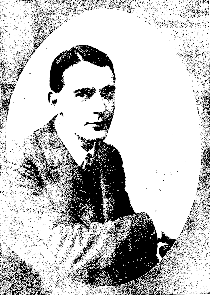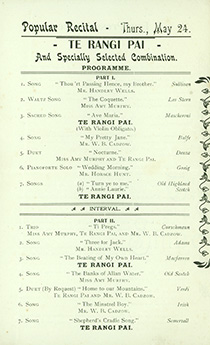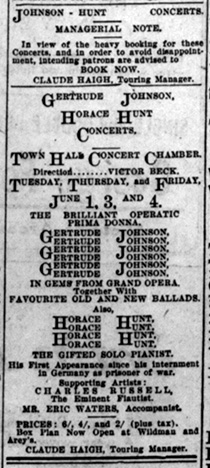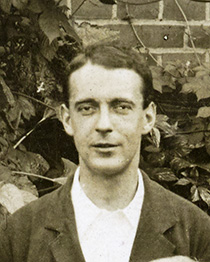
Horace Hunt, Ruhleben, Summer 1917. Detail from a group photograph of New Zealand internees. Jones Family papers. MSS & Archives 2014/6, 1/14/4, Special Collections, University of Auckland Libraries and Learning Services.
‘I am trying (rather ambitiously perhaps) to dramatise one or two of Sir Geo Grey’s tales [and] get Hunt to train a choir to render Maori choruses and another friend to paint a series of ethnological pictures etc.’
Albert Jones writing home to his family from Ruhleben, 25 March 1916. Jones Family papers. MSS & Archives 2014/6, 1/8/3, Special Collections, University of Auckland Libraries and Learning Services.
Interned in Germany
In June 1913, Hunt, aged 27, left New Zealand to further his musical studies. He travelled first to London and then to Germany and was living in Berlin when war was declared on 4 August 1914. The outbreak of war caught many British citizens living in the city by surprise as most believed, even in late July, that war would be averted at all costs. Immediately, foreign nationals were prevented from leaving Berlin and required to register with the police. Hunt was arrested as an enemy alien on 24 September 1914 and taken to the Stadtvogtei Prison in the Alexander Platz. There, he and other civilian prisoners were held with the general prison population until late October when they were moved to the Ruhleben civilian internment camp near Spandau on the outskirts of Berlin. Hunt described the location of the camp, which was set up in the grounds of a racecourse, as the `Ellerslie of Berlin.’
At its peak, Ruhleben held some 4,500 men, including a number of musicians, conductors and composers who had also been working or studying in Germany. These talented internees banded together, forming choirs, an orchestra and other ensembles. As early as Christmas 1914, a choir directed by British conductor Charles Adler performed excerpts from The Messiah and during the summer of 1915 the Ruhleben Musical Society organised a series of outdoor promenade concerts. Other concerts showcased original works composed within the camp.
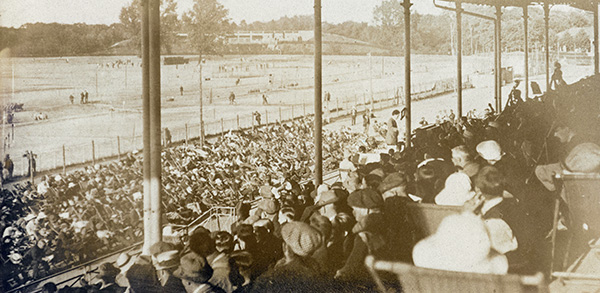 Promenade concert, Ruhleben camp, June 1918. Jones family papers. MSS & Archives 2014/6, 1/16/6, Special Collections, University of Auckland Libraries and Learning Services.
Promenade concert, Ruhleben camp, June 1918. Jones family papers. MSS & Archives 2014/6, 1/16/6, Special Collections, University of Auckland Libraries and Learning Services.
In a post-war interview, Hunt noted that being involved in such activities had preserved the sanity of many and ‘the stimulating contact of keen intellects’ provided some consolation for the physical hardships of camp life. Hunt is recorded in the first issue of the Ruhleben camp magazine as having presented a lecture on Grieg and performed and directed works by the composer at an Arts and Sciences Union musical evening. He also wrote the music for Hinemoa and Hawaiki, a play based on two Māori legends, produced by fellow New Zealander Albert Jones, at the Ruhleben Theatre in November 1916.
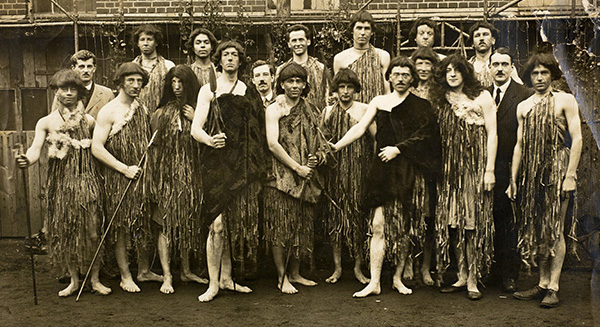 Cast of Hinemoa and Hawaiki. Horace Hunt in suit and tie, front row, second from the right.Jones family papers. MSS & Archives 2014/6, 1/9/1, Special Collections, University of Auckland Libraries and Learning Services.
Cast of Hinemoa and Hawaiki. Horace Hunt in suit and tie, front row, second from the right.Jones family papers. MSS & Archives 2014/6, 1/9/1, Special Collections, University of Auckland Libraries and Learning Services.



